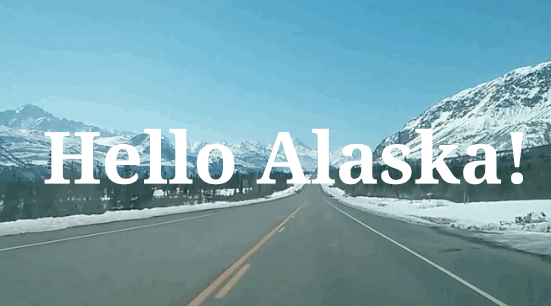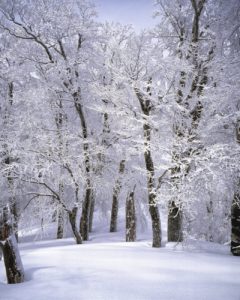 Lately, I’ve been thinking about climate change and how the expectations of what winter, or any other season, will be like in the average year are changing.
Lately, I’ve been thinking about climate change and how the expectations of what winter, or any other season, will be like in the average year are changing.
The official graphs and charts that show how rapidly the average temperatures are climbing from one decade to the next are obviously quite important, but I think there’s something to be said for listening to and writing down anecdotes about the climate as well. Future generations might like to know what things were like when we were young and the Earth was colder.
My first clear memories of winter happened in the early 1990s. My family lived in Wyoming then, and our town was nestled so close to the Rocky Mountains that we regularly saw heavy snowstorms between the months of October and May.
I think my family was snowed in at least once during these storms. There is only so much plowing that can be done before the blizzard wins and everyone needs to stay off those slippery roads for safety reasons.
Before I tell this next story, keep in mind that I was always petite for my age growing up. Not every child would have been light enough to pull this off, but I do have memories of walking on top of frozen snowbanks when I was about seven or eight years old. The snow had melted a little, and when it refroze it created a sort of crust on top of it that I could just barely walk on top of. I felt like a superhero and was a little disappointed the next winter when I realized that I was too heavy to do that trick again. (The funny thing was, I remained one of smallest kids in my class all the way through to high school graduation!)
In the mid-1990s, my family moved back to Ohio. Every year we’d generally have at least a few days cancelled due to snow or ice storms. Ohio was a less snowy place than Wyoming, so I don’t remember quite as many times when the roads were closed due to storms as they did when we lived out west.
I do remember feeling a little surprised by the lessening amounts of snow as the years rolled on. Part of it was almost certainly due to the fact that I was growing into my full adult height and viewing snowdrifts from that perspective instead of the point of view of a young child, but I also wonder if I wasn’t noticing the effects of climate change.
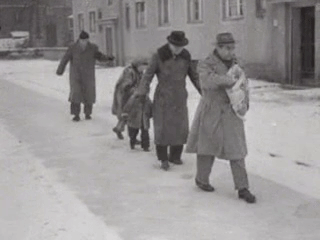
The winter of 1998-1999 was an exception to that trend. We had a huge snowstorm at the tail end of Christmas break that delayed the reopening of school by about two weeks. My family just so happened to be moving into a new house then, so my first recollections of 1999 were of perpetually-damp boots, gloves, and hats drying by the radiator while we unpacked our belongings one minivan full of them at a time.
I moved to Toronto in 2005. The climate was fairly similar to Ohio, but I’ve noticed winters seem to be morphing into drier and more erratic versions of themselves here over time. We still have some snowstorms, but we’ve also had weird weeks in the dead of January or February where the temperatures climb into early spring numbers (10-15C, or roughly 50-60 degrees Fahrenheit for you Americans) for a day or even a week before growing cold again.
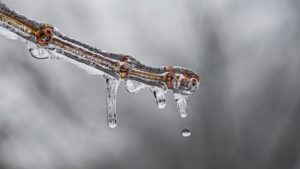 This is truly bizarre, and I wonder if it will become the new normal for future generations. Will they no longer need heavy winter jackets, gloves, hats, and scarves? How will they react to the thought of a winter that doesn’t thaw out again until March? I suspect they won’t understand that concept at all, except as an academic exercise when they read about what life was like before climate change.
This is truly bizarre, and I wonder if it will become the new normal for future generations. Will they no longer need heavy winter jackets, gloves, hats, and scarves? How will they react to the thought of a winter that doesn’t thaw out again until March? I suspect they won’t understand that concept at all, except as an academic exercise when they read about what life was like before climate change.
I’m interested in hearing your stories about how winter has changed and is changing where you live. If you live in a climate that doesn’t have winter, feel free to talk about how the weather is changing in whatever ways you might have noticed since you were a kid.


 2. The Town of Stepford from “The Stepford Wives.”
2. The Town of Stepford from “The Stepford Wives.”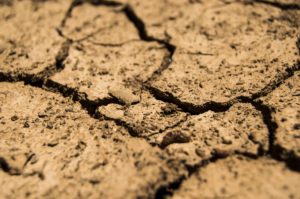 Honestly, why would anyone actually want to go to Mordor if they didn’t have to? Just reading the descriptions of this barren, volcanic wasteland in the Lord of the Rings was more than enough for me.
Honestly, why would anyone actually want to go to Mordor if they didn’t have to? Just reading the descriptions of this barren, volcanic wasteland in the Lord of the Rings was more than enough for me.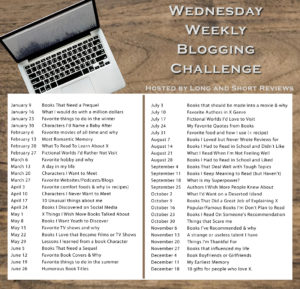

 Honestly, what Harry Potter fan wouldn’t want to eat a chocolate frog or a sherbet lemon from that shop or one like it? Who knows what other magical treats have been introduced to the wizarding world in the last couple of decades.
Honestly, what Harry Potter fan wouldn’t want to eat a chocolate frog or a sherbet lemon from that shop or one like it? Who knows what other magical treats have been introduced to the wizarding world in the last couple of decades. For those of you who aren’t too familiar with the various legends of King Arthur, Avalon is the magical island where King Arthur was taken to recuperate after he was wounded in battle.
For those of you who aren’t too familiar with the various legends of King Arthur, Avalon is the magical island where King Arthur was taken to recuperate after he was wounded in battle. I have a slightly embarrassing story to share with all of you today. About two weeks ago, I was walking around barefoot in my house and accidentally smashed my little toe into one of my hand weights that was lying on the floor.
I have a slightly embarrassing story to share with all of you today. About two weeks ago, I was walking around barefoot in my house and accidentally smashed my little toe into one of my hand weights that was lying on the floor. One of the best parts of living in Toronto is how accessible everything is, especially if you live in a dense, urban part of the city. When I’m not injured, I can get all of my errands finished without ever needing to use a car or even public transportation for the vast majority of the year. There are multiple grocery stores, post offices, pharmacies, clinics, other medical offices, and speciality stores within walking distance of my home.
One of the best parts of living in Toronto is how accessible everything is, especially if you live in a dense, urban part of the city. When I’m not injured, I can get all of my errands finished without ever needing to use a car or even public transportation for the vast majority of the year. There are multiple grocery stores, post offices, pharmacies, clinics, other medical offices, and speciality stores within walking distance of my home. Yes, I’ll admit that this might be an unusual thing to miss. I used to strongly dislike the feeling of perspiration running down my back when I was a kid and had to go straight from gym class to sitting quietly and taking notes for english or history.
Yes, I’ll admit that this might be an unusual thing to miss. I used to strongly dislike the feeling of perspiration running down my back when I was a kid and had to go straight from gym class to sitting quietly and taking notes for english or history.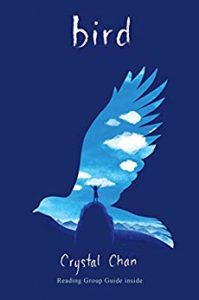
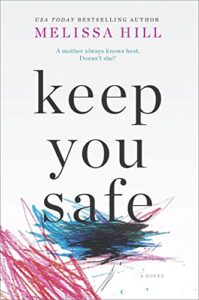


 I regularly read nonfiction books about history, but they’re generally not about the sorts of topics you’d learn in a formal class on this topic. Instead, I tend to be drawn to descriptions of things like the food or social customs of people who weren’t wealthy or famous. There’s something incredibly interesting to me about learning about what the daily lives of ordinary people were like a few or many generations ago
I regularly read nonfiction books about history, but they’re generally not about the sorts of topics you’d learn in a formal class on this topic. Instead, I tend to be drawn to descriptions of things like the food or social customs of people who weren’t wealthy or famous. There’s something incredibly interesting to me about learning about what the daily lives of ordinary people were like a few or many generations ago Today is Family Day for those of us who live in Alberta, British Columbia, Ontario, New Brunswick, or Saskatchewan. Family Day was first observed in 2007 in New Brunswick, and it was created in order to give people a paid day off in February to rest and spend time with their families.
Today is Family Day for those of us who live in Alberta, British Columbia, Ontario, New Brunswick, or Saskatchewan. Family Day was first observed in 2007 in New Brunswick, and it was created in order to give people a paid day off in February to rest and spend time with their families.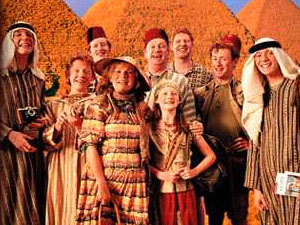 The Weasley Family from J.K. Rowling’s Harry Potter series.
The Weasley Family from J.K. Rowling’s Harry Potter series. 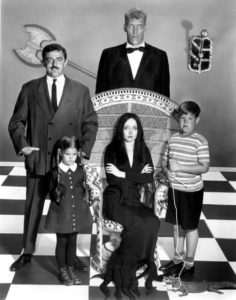 When I was a kid, my family wavered between having a TV and taking breaks from living with one. When we did have a TV, it was common for us to only be able to watch the channels that could be seen for free if you had an antenna and the wind was blowing the right way. (This is only a partial joke. The weather really could influence what channels we could get on stormy days from what I recall!)
When I was a kid, my family wavered between having a TV and taking breaks from living with one. When we did have a TV, it was common for us to only be able to watch the channels that could be seen for free if you had an antenna and the wind was blowing the right way. (This is only a partial joke. The weather really could influence what channels we could get on stormy days from what I recall!) Once my family got a television, (temporarily) signed up for cable service, and began watching more contemporary programs, I quickly learned which show I enjoyed the most: The Simpsons!
Once my family got a television, (temporarily) signed up for cable service, and began watching more contemporary programs, I quickly learned which show I enjoyed the most: The Simpsons! I haven’t been reading many books lately. It started last month when I went on vacation to someplace warm and sunny. Ontario is such a dark and cold place during the winter that I wanted to spend as much time as I could in the sun during that week without getting burned or tanned.
I haven’t been reading many books lately. It started last month when I went on vacation to someplace warm and sunny. Ontario is such a dark and cold place during the winter that I wanted to spend as much time as I could in the sun during that week without getting burned or tanned. The nice thing about reading breaks is that they give you a chance to step away from these patterns if you also tend to stick to the same genre(s) with every new title you pick up. Sometimes my breaks are short and punctuated by a stack of non-fiction books about history, food, medicine, or other topics I find appealing. Other breaks find me not reading any full-length books at all or visiting portions of the library that I typically skip over altogether.
The nice thing about reading breaks is that they give you a chance to step away from these patterns if you also tend to stick to the same genre(s) with every new title you pick up. Sometimes my breaks are short and punctuated by a stack of non-fiction books about history, food, medicine, or other topics I find appealing. Other breaks find me not reading any full-length books at all or visiting portions of the library that I typically skip over altogether.